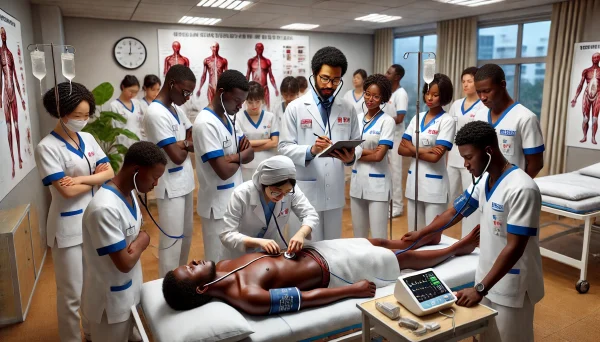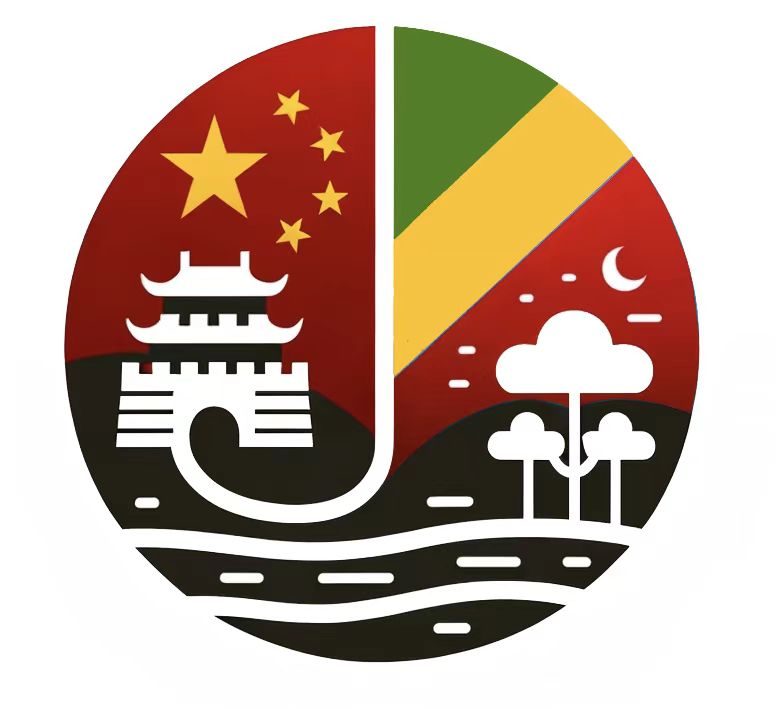Introduction of China's Medical Care Training Program for International Students from Republic of Congo
In recent years, with the increasing demand for highly skilled nursing personnel in the global healthcare field and the deepening of China-Africa cooperation, education and training in the field of healthcare and nursing has gradually become one of the important directions of cooperation between the two countries. As an important country in west-central Africa, Republic of Congo, the lack of medical resources and nursing personnel has always been a major challenge in its public health field. In order to enhance the Republic of Congo’s capacity building in the field of medical care and help the country cultivate highly qualified and specialized nursing personnel, China has launched a project under the framework of China-Africa cooperation to receive international students from the Republic of Congo for medical care training.
Through this program, students from Republic of Congo will have the opportunity to enter China’s higher medical schools, receive modern nursing education, learn advanced medical technology, nursing theory and practical skills, and eventually bring their knowledge and experience back to their home country to promote the development of Republic of Congo’s health field. The following is a detailed description of this training program.
I. Background of the project
1. The current situation of medical care in the Republic of Congo.
The Republic of Congo’s current healthcare system is still in the development stage, with a lack of public health resources, insufficient medical facilities, and the number of professional medical staff is far from enough to meet the demand. Especially in remote areas, basic care services are hardly covered. At the same time, the demand for nursing professionals in Republic of Congo shows a continuous upward trend with the growth of population and the increase of disease burden.
However, the development of the nursing profession faces many challenges:
– Lack of professional education: The nursing education system is weak and the training content is relatively outdated, making it difficult to meet the requirements of modern healthcare.
– Inadequate technical skills: nursing staff generally lack the ability to use modern medical equipment and technology.
– Global health challenges: the epidemic of infectious and chronic diseases requires higher quality nursing services.
2. China’s strengths in medical and nursing education
China has rich experience and a well-developed system in the field of medical and nursing education. As an active participant in global healthcare reform, China’s nursing education combines theory and practice, covering a full range of training from basic care to specialized care, and has formed an effective education system. At the same time, Chinese medical institutions have accumulated rich experience in dealing with infectious diseases, emergency care, geriatric care and other fields, and are able to provide Republic of Congo students with nursing education with an international perspective.
In the context of China-Africa cooperation, China is committed to helping African countries to solve the problem of insufficient medical human resources, and providing medical and nursing training for international students from Republic of Congo can not only promote the development of health care in Republic of Congo, but also deepen the friendship and cooperation between the two countries.
II. Objectives and significance of the training program
1. Training objectives
The main objectives of China in accepting international students from Republic of Congo for medical and nursing training include:
– Cultivate high-quality nursing talents: through systematic training, help Republic of Congo students master advanced nursing theories and practical skills, so as to lay the foundation for them to become the backbone of the country’s medical system.
– Enhance nursing skills: help students become skilled in the use of modern medical equipment and master advanced nursing techniques, such as critical care, surgical care, infectious disease care, and so on.
– Promote the development of local health care: after graduation, students can apply the knowledge and skills they have learned to the medical practice in their own country, and improve the quality of medical and nursing services in the Republic of Congo.
– Promote China-Africa medical cooperation: through nursing training, strengthen exchanges and cooperation between China and Congo in the field of medical care, and deepen the friendly relations between the two countries.
2. Significance of training
– Filling the gap of nursing talents: the lack of nursing talents in Republic of Congo is particularly prominent in the public health crisis, and this training program will directly train a large number of much-needed professionals for them.
– Enhance public health capacity: The trained nursing staff will significantly improve the capacity of the Republic of Congo’s public health system to respond to emergencies.
– Promote gender equality and professional development: The nursing profession offers excellent opportunities for women to develop their careers, and the program will help to promote women’s professional participation in the medical field in the Republic of Congo.

Training content and curriculum
1. Basic nursing course
Republic of Congo students will receive a comprehensive basic nursing curriculum at the beginning of their training, which includes:
– Fundamentals of nursing: concepts and development of nursing, ethical and legal issues, patient communication and psychological care.
– Basic medical knowledge: anatomy, physiology, pharmacology and pathology, which provide the necessary medical foundation for nursing practice.
– Patient care techniques: basic skills in patient life care, health assessment, temperature measurement, and infusion.
2. Specialized Nursing Courses
As the study progresses, students will enter the stage of specialized nursing courses, the study content includes:
– Emergency and Critical Care Nursing: emergency nursing techniques, cardiopulmonary resuscitation, critical care skills (e.g., ventilator management, electrocardiographic monitoring).
– Surgical Nursing: surgical preparation, aseptic techniques, assistance during surgery and post-operative care.
– Infectious Disease Nursing: Nursing approaches to infectious diseases (e.g., malaria, AIDS, tuberculosis, etc.) and infection control techniques.
– Geriatric Nursing: health assessment, chronic disease management and psychological support for the elderly.
3. Practice and Internship
In addition to theoretical studies, practical courses are an important part of the training:
– Laboratory operations: students will receive hands-on training in nursing skills, including basic operations and equipment use.
– Hospital internship: Students will be placed in a large Chinese hospital or healthcare facility to participate in actual nursing care and learn from Chinese healthcare professionals.
– Simulated Ward Training: Through simulated situation teaching, students can practice nursing skills in a simulated clinical environment to enhance their practical coping skills.
4. Intercultural Nursing and Global Health
To help students better adapt to nursing care in different cultures, the course also provides:
– Transcultural Nursing: help students understand the health needs and nursing care of patients in different cultures.
– Global Health and Public Health: to learn about health challenges and solutions in the global context, including epidemic management, public health education, etc.

IV. Learning Environment and Support Services
1. Quality Teaching Facilities
The training program will be conducted in China’s top medical schools, which are equipped with advanced teaching facilities, such as multimedia classrooms, nursing laboratories, simulation wards, etc., to provide students with a favorable learning environment.
2. Highly Qualified Faculty
The program is taught by experienced nursing professors, clinical nursing experts and practice instructors, combining theoretical and practical teaching to ensure that students can fully grasp the knowledge and skills.
3. International Student Support Services
The school will provide a series of support services for international students from Republic of Congo, including:
– Life support: assist students in arranging accommodation, meals and other basic living needs;
– Language support: provide Chinese or English language courses to help students adapt to study and life faster;
– Psychological counseling: set up a mental health counseling service to provide students with emotional support and guidance on cultural adaptation.
V. Enrollment Requirements and Process
1. Enrollment conditions
– Be at least 18 years old and in good health;
– Possess high school education or above, medical or nursing related background is preferred;
– Provide a valid passport and relevant supporting documents;
– Have a basic knowledge of English or French.
2. Application process
– Submission of application: Fill in the application form, submit a copy of passport, proof of education and personal statement;
– Material examination: the school examines the student’s qualifications and conducts an interview if necessary;
– Confirmation of acceptance: After passing the examination, the school will send an acceptance letter;
– Visa application: students apply for a Chinese student visa with the acceptance letter;
– Admission arrangement: Upon arrival in China, the school arranges orientation activities to help students adapt to their studies and life in China.
VI. Program Achievements and Future Prospects
The implementation of the project of China accepting international students from Republic of Congo for medical and nursing training will train a large number of specialized and modern nursing talents for Republic of Congo, who will play a key role in the country’s medical and health care. In addition, the project will also:
– Strengthen China-Africa cooperation: further deepen exchanges between China and Republic of Congo in the field of healthcare through educational cooperation;
– Enhance global health: cultivate more internationalized talents who know modern nursing techniques and contribute to global health;
– Promote the transformation of the Republic of Congo’s health system: the students will bring back advanced nursing techniques and concepts after returning to their home countries, which will promote the modernization and internationalization of the Republic of Congo’s medical care.
This program is not only an important achievement of China-Africa educational cooperation, but also a vivid manifestation of China-Africa friendship, injecting new impetus for the health and well-being of the people of Republic of Congo and the long-term development of China-Africa relations.

